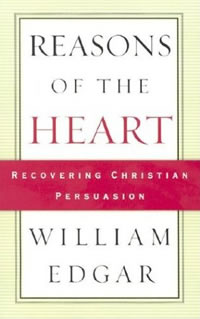Book Notes
 William Edgar, Reasons of the Heart; Recovering Christian Persuasion (Phillipsburg, New Jersey: P&R Publishing Company, 1996, 2003), 128pp.
William Edgar, Reasons of the Heart; Recovering Christian Persuasion (Phillipsburg, New Jersey: P&R Publishing Company, 1996, 2003), 128pp.
Guest review by Ray Cowan
I found this slender, 120-page volume to be an eye-opener. It could well be described as an "apologetic for Christian apologetics." Differing from many popular and scholarly apologetics works which address specifics of Christian belief, this book is much more strategic in its approach. Edgar argues for, and presents, a wholesome approach to Christian apologetics — the giving of a defense, or sound argument (p. 41, p 43), for why we trust God and Christ. Many of us probably don't think of ourselves as apologists very often, but whenever we speak up for the faith, or commend it to others, we are in reality doing some part of the work of apologetics.
Edgar lays the foundations for Christian belief in the first half of the book, then follows this up with a number of "conversations" on issues that are common barriers to belief. Most importantly, he maintains a holistic perspective, keeping in mind that Christian belief is as much a matter of the heart as it is a matter of factual knowledge and logic. That's not to say that matters of the heart are irrational, but rather — with Pascal — that the heart "has its reasons of which reason knows nothing." It's the whole person that comes to trust God, not the mind alone, or the heart alone.
Edgar argues that Christian apologetics is, by its nature, a persuasive endeavor, and not one of manipulating deductive facts and propositional logic alone. Nor is it one that calls for shallow, unreasoned leaps of "faith." Rather, starting from the position that the historic, foundational beliefs of Christianity are true (such as the divinity of Christ, his resurrection, the need for redemption), we may assume that there will be conflicts with reality in any view or belief that is in opposition to them. The main business of Christian persuasion is, then, to help people discover for themselves where their views are in conflict with the way the world really is (as theologian Dallas Willard would say, "reality is what you run into when you're wrong"). Edgar calls this process "disclosure." As he says, "The work of the apologist is to uncover the tension between unbelief and the knowledge of God that everyone has." (p. 56).
But the duty of apologetics doesn't end with disclosure. One does not want to help people along to the point where they see the failings in their worldview, and then abandon them; this is the way to despair. Disclosure is to be followed by "homecoming." Edgar says, "Faith is not only knowing the story, but embracing it through a whole-souled trust in the God who freely gives us the good news… To believe this message is to come home." (p. 58–59).
In the second, "conversations" part of the book, Edgar discusses some common barriers to belief, asking the question, "Why do people resist considering the most basic questions about life?" (p. 17). He then covers three important issues that often come up in discussions of faith: (1) religion as illusion; (2) pluralism (is Christ the only way?); and (3) the problem of evil. While not exhaustive, the treatment of each is relatively thorough and surprisingly powerful.
The book concludes with a review and summary of apologetics and its goal: "…to lead doubters to faith by a proper understanding of who God is…faith is not an irrational leap, but a basic trust in the One we have every reason to trust." (p. 114).
William Edgar is a fascinating person. The author of several books, he is on the faculty of Westminster Theological Seminary in Philadelphia. He holds a Th.D. from the Université de Genève and spent time at Francis Schaeffer's l'Abri community. He is a professional jazz musician (see his album Heaven in a Nightclub), with interests in the roots of jazz and ragtime in the early spiritual music of slaves in the eighteenth and nineteenth centuries. For more on Christian persuasion, you can listen to his The Art of Persuasion talk at the European Leadership Forum.
Ray F. Cowan, Ph.D. (rcowan@mit.edu)
Laboratory for Nuclear Science
Massachusetts Institute of Technology
Cambridge, Massachusetts


